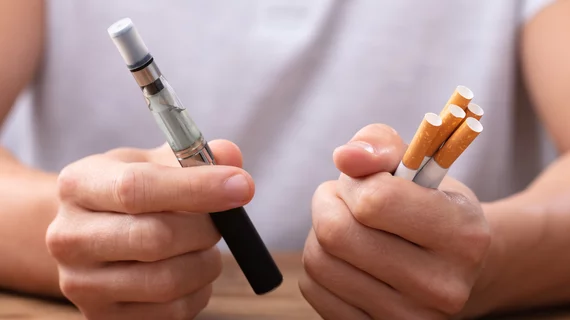FDA rules Juul vape products can’t be marketed, sold
The U.S. Food and Drug Administration (FDA) has issued marketing denial orders to Juul Labs, effectively banning the company from marketing its vape products.
The move also means Juul cannot sell and distribute its products. Plus, Juul must remove products that are currently on the U.S. market, or risk enforcement action.
The FDA’s decision comes after Juul came under fire in the past few years for an uptick in vaping and nicotine use among teenagers. Some studies have shown that vaping, or e-cigarette use, can be more harmful to heart health than cigarettes. In 2018, the FDA conducted a surprise inspection of Juul Labs in California, reportedly looking into how the company marketed its products. The company was also said to be selling nicotine flavors that target teenagers.
“Today’s action is further progress on the FDA’s commitment to ensuring that all e-cigarette and electronic nicotine delivery system products currently being marketed to consumers meet our public health standards,” FDA Commissioner Robert M. Califf, MD, said in a statement about the agency’s decision. “The agency has dedicated significant resources to review products from the companies that account for most of the U.S. market. We recognize these make up a significant part of the available products and many have played a disproportionate role in the rise in youth vaping.”
The FDA made its decision after reviewing the company’s premarket tobacco product applications (PMTAs), determining “the applications lacked sufficient evidence regarding the toxicological profile of the products to demonstrate that marketing of the products would be appropriate for the protection of the public health.”
Juul disagreed with the agency’s decision.
“In our applications, which we submitted over two years ago, we believe that we appropriately characterized the toxicological profile of JUUL products, including comparisons to combustible cigarettes and other vapor products, and believe this data, along with the totality of the evidence, meets the statutory standard of being appropriate for the protection of the public health,” Joe Murillo, chief regulatory officer at Juul Labs, said in a statement June 23. “We intend to seek a stay and are exploring all of our options under the FDA’s regulations and the law, including appealing the decision and engaging with our regulator.
The agency also noted the applications contained insufficient and conflicting data around genotoxicity and potentially harmful chemicals in the company’s proprietary pods. Concerns around this data have not been sufficiently addressed, preventing the FDA from completing a full toxicological risk assessment of the products. The products included in the FDA’s decision are: the Juuldevice and four types of Juul pods: Virginia tobacco flavored pods at nicotine concentrations of 5.0% and 3.0% and menthol flavored pods at nicotine concentrations of 5.0% and 3.0%.
The FDA noted it has not received clinical data showing an immediate hazard from use of the Juul devices or Juul pods, but the agency determined there is insufficient data to assess the toxicological risks. The agency also advised against modifying or adding substances to tobacco products, as well as encouraged users to report any unexpected health problems or product problems to the FDA through the Safety Reporting Portal and to seek medical attention as necessary.
“The FDA is tasked with ensuring that tobacco products sold in this country meet the standard set by the law, but the responsibility to demonstrate that a product meets those standards ultimately falls on the shoulders of the company,” said Michele Mital, acting director of the FDA’s Center for Tobacco Products. “As with all manufacturers, JUUL had the opportunity to provide evidence demonstrating that the marketing of their products meets these standards. However, the company did not provide that evidence and instead left us with significant questions. Without the data needed to determine relevant health risks, the FDA is issuing these marketing denial orders.”
The FDA has authorized 23 electronic nicotine delivery system (ENDS) products. The decision comes just days after the FDA announced its plan to require tobacco companies to limit nicotine levels in tobacco products. In the U.S., smoking is the leading cause of preventable death, according to the Centers for Disease Control and Prevention (CDC).

